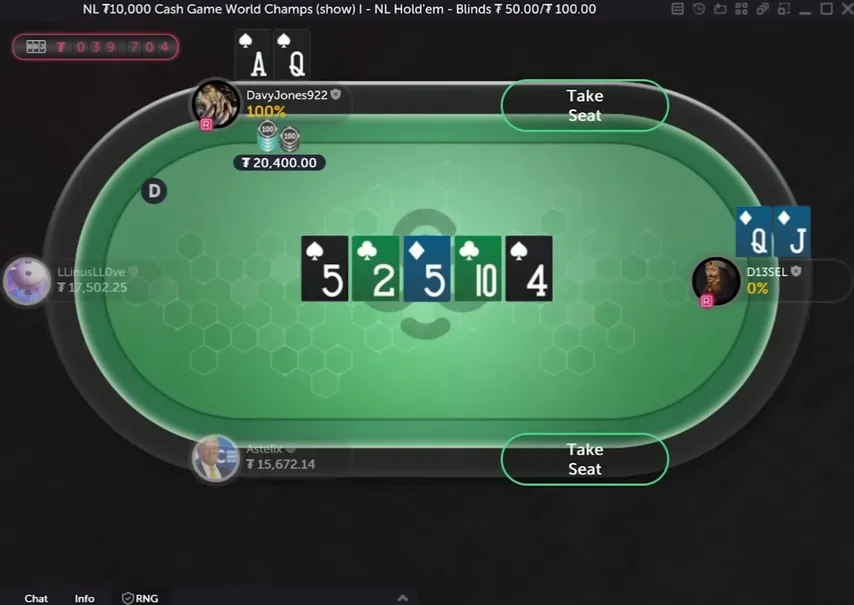Chances are you're a nit.
On average, most players fold too often in most spots. So what, now you just start calling down every hand? Well, not so fast. It's a bit more complicated than that. And also, for you, it might not even be necessary to stop folding. Instead, there is another way to profit from this information.
Let's follow DavyJones (Roberto Perez), one of high stakes' most feared crushers, as he defends Ace-Eight offsuit against LLinusLLove, who is widely considered the GOAT of cash games, in this Cash Game World Championship on CoinPoker. There is no rake. Yes, you heard that right, zero rake! So, both the button's opening range as well as the big blind's calling range can be slightly wider than in normal games.
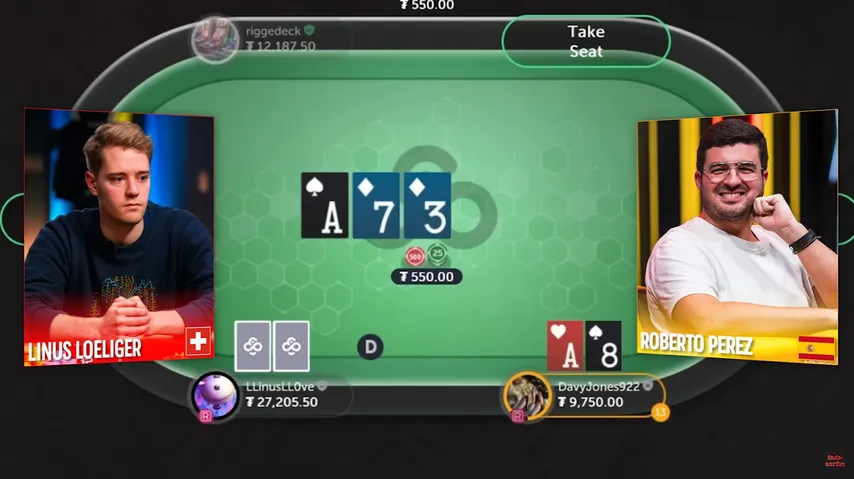
On the flop , facing a 25% pot c-bet is standard. For Linus, most hands mix bets and checks with an overall betting frequency of 66%. But even just betting your entire range would only cost you 0.1 big blinds, so less than 2% of the pot, an amount small enough to justify simplifying your life and making sure you don't make a bigger mistake on the flop.
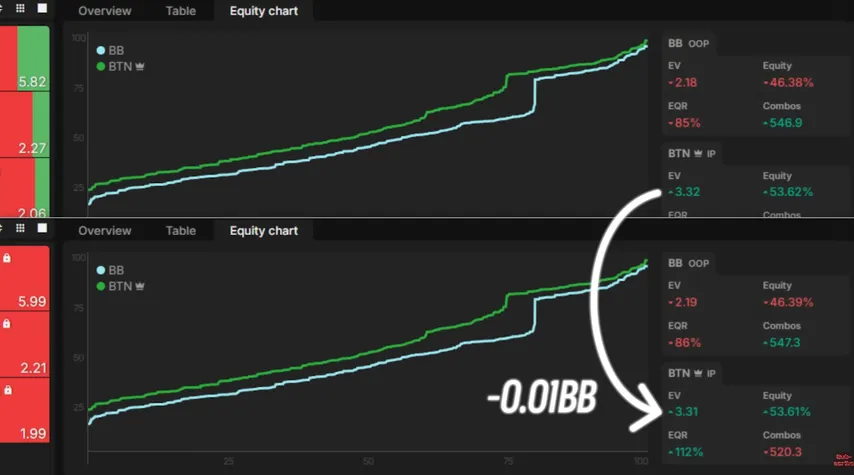
Since we don't know if that's what Linus does here, as he is after all, Linus, we'll continue working with the original c-betting strategy here, but we'll get back to the range B later on. Against the c-bet, Ace-Eight is an easy check-call, but since the bet is so small, even hands like Ten-Eight with a diamond and Nine-Six of spades would have to call here—low equity backdoor draws that are often folded by many players.
On the turn , it gets more interesting.
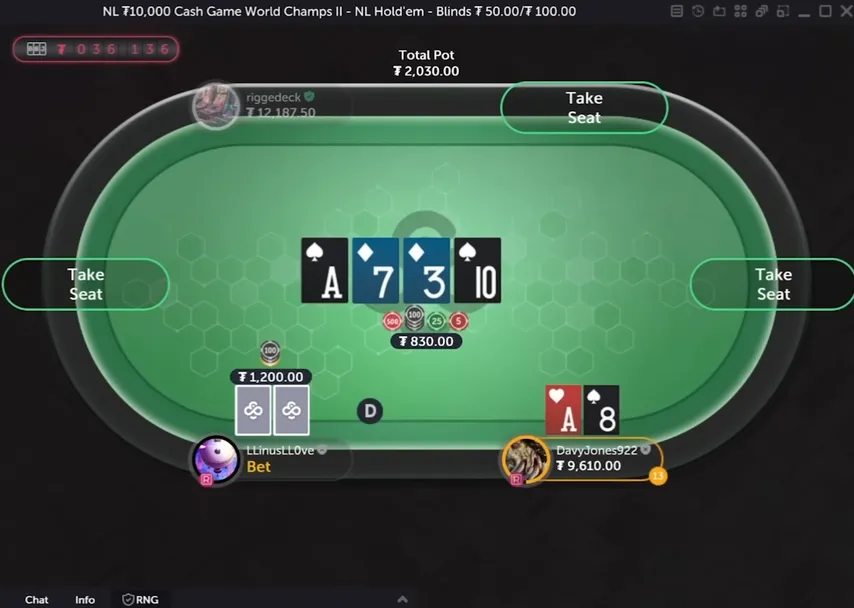
This close to 150% overbet is part of the solver's strategy and very polarizing, which means it consists of very good hands like Ace-Jack and better and many bad hands, so mostly King-High and worse. On this double suited board, many of those King-High and worse hands are flush draws, but not all of them want to bet all the time. At first glance, it's difficult to see what factors make you prefer betting or checking a certain flush draw, but as a rough guideline, focusing on these factors can help you make a decision.
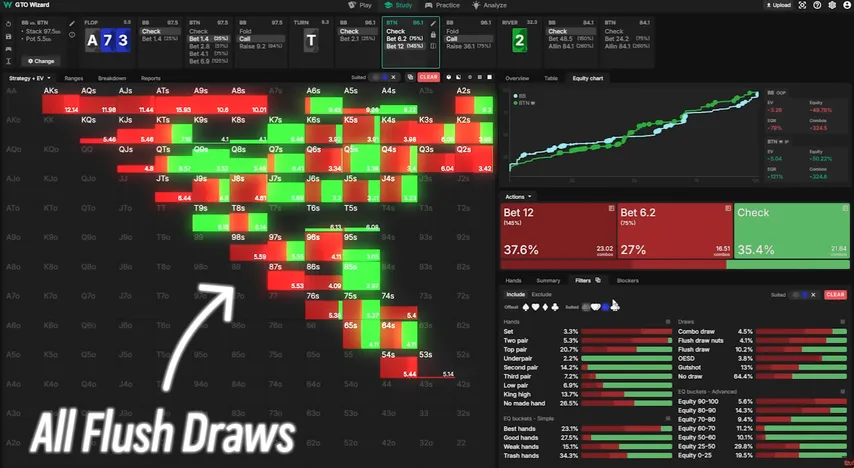
- One, do they have additional equity?
Flush draws that have a straight draw with them, so combo draws, are almost always bet here. Having additional equity allows you to put more money into the pot, especially when the stack-to-pot ratio is big enough for you to not really have to worry about getting shoved on and having to fold your equity. - Two, do they get called by worse flush draws, or are they folding out better?
Most King-High flush draws bet most of the time when the big blind would call some Queen-High flush draws. Betting your King-High flush draws is somewhat of a value bet against them. Meanwhile, betting Jack-High flush draws benefits from our opponents folding some Queen-Highs. When you bet Jack-X of spades and your opponent folds Queen-X of spades, hitting your flush on the river is simply more profitable. Also, the Jack is a great blocker as it prevents your opponent from having a lot of combo draws: King-Jack, Queen-Jack, Jack-Ten, and Jack-Eight suited. Queen-Nine and Queen-Eight prefer checking. When they bet, they get called by many better flush draws but fold out weaker ones that they could have cooled on a flush river, and they don't block as many combo draws. Neither do hands like 9-5 and 8-5 suited. They never get called by worse flush draws, only better, so they also purely check.
Now with that many bluffs in Linus's range, DavyJones still has a clear call with all of his Aces. But even a few second pairs without a flush draw would have to call to not overfold. Against an overbet turn barrel, we also see the average player slightly overfold.
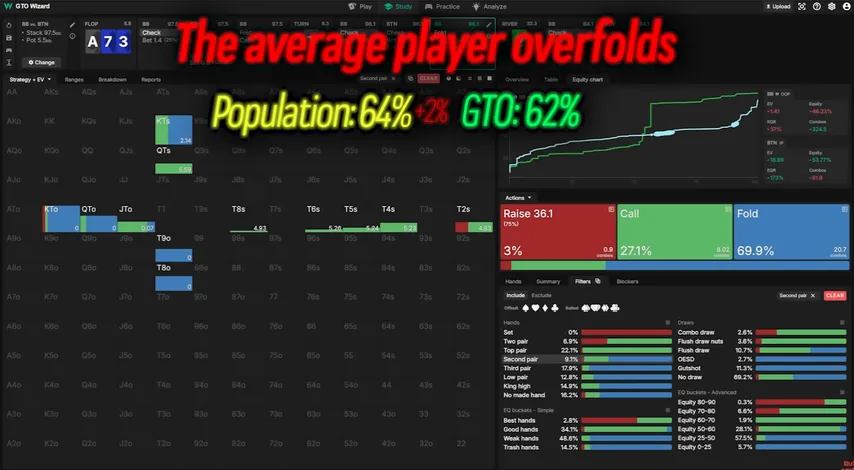
The river is a and Linus gets serious.
This roughly 2.5x overbet is again very polarized. Value bets would only be two pair or better, while bluffs would consist of Queen-high and worse. Now, whether Linus uses more than just this overbet size or also employs a 75% size for thinner bets (like the solver does), we don't know. For simplification, we'll work with only the oversized here.
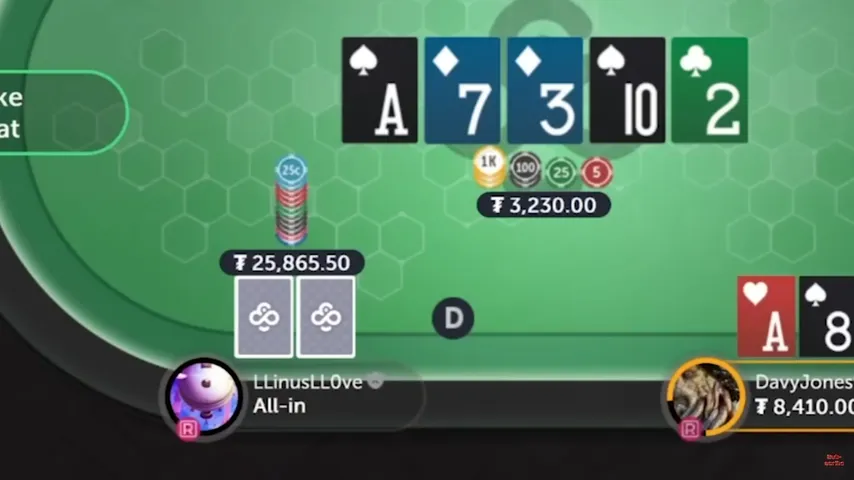
Judging this as a human, the value betting part is reasonably easy to understand and apply. Anything but the worst two pair, so 10-7, is good enough to jam. The difficult part to get right is the bluffs. Betting around 40% of your bluffs is the balanced GTO strategy—if you arrived at this point with a perfectly balanced range. Having all of these hands that could bluff but only betting the right ones and at the correct frequency is very difficult.
We're not even looking at King-high hands here, which always check. Even below that, the best air hands always check. So, Jack-8 to Queen-Jack pretty much purely check. Conversely, the worst hands—like 8-high and 6-high—always go for the bluff. But everything in between is much more complicated.
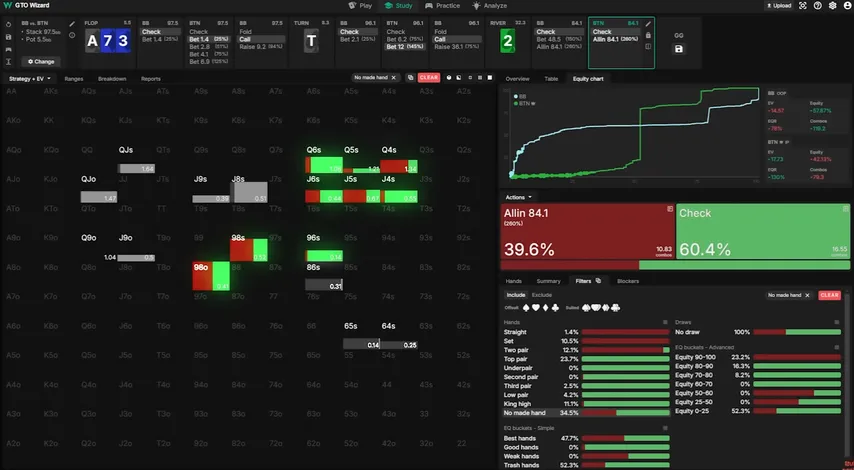
There’s a preference to bet non-diamonds and non-spades because those block missed flush draws in Davy's range. But then sometimes spades bet and diamonds don’t, and sometimes diamonds bet but spades don’t.
Without getting too deep into that, we can agree that getting this right isn't easy. If Linus does get it right, though, DavyJones's A8 would be a clear fold.
So what is he doing here?
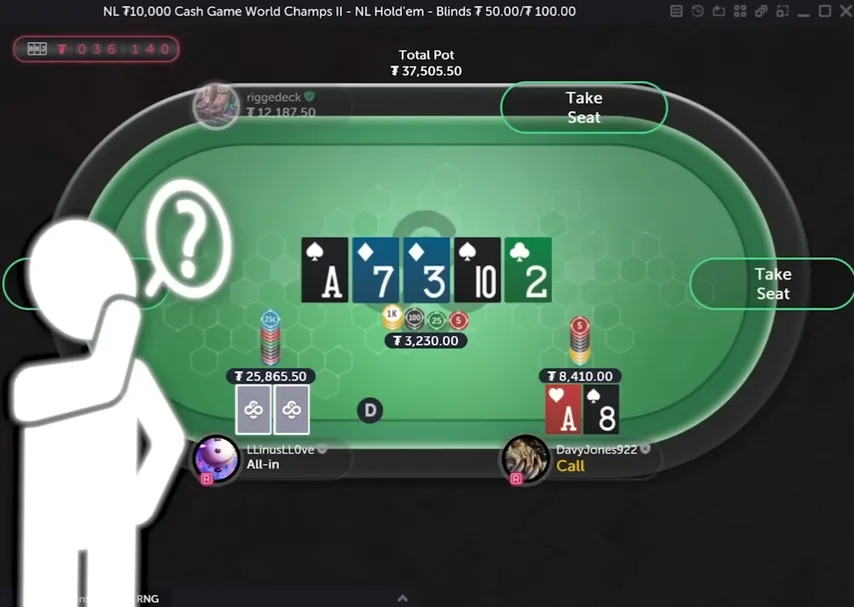
Technically, he could just be clicking buttons and not know what he’s doing, but that’s not what’s happening. The most likely reason for making this non-GTO call is that he thinks Linus is over-bluffing here.
As we saw, hitting the right river frequency isn't easy, so betting more than the 40% of air hands you’re allowed to is definitely possible. What might add to that is that you might even have more air hands in the first place. As we saw, range betting the flop is also a good approach for cash betting. If that were the case, 100% of Linus's range would make it to the turn instead of just 66%, which means a lot more air hands.
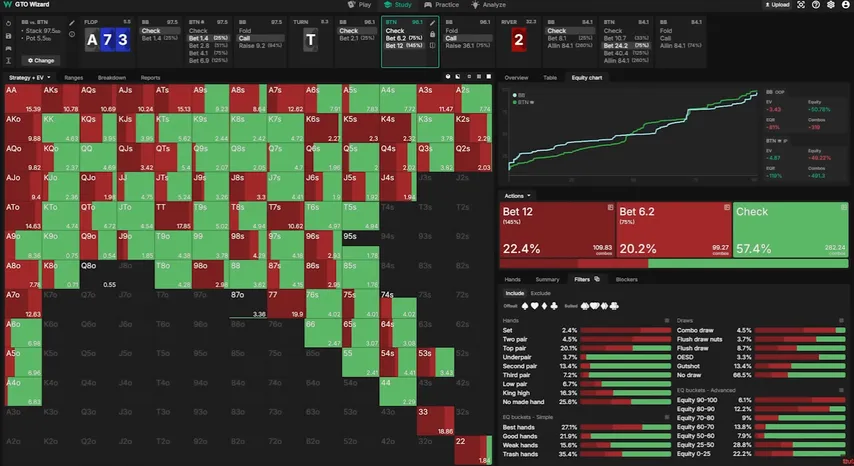
On the turn, 46% of draws—like gut shots, open-enders, and flush draws—would have to check, but it's not uncommon to barrel those more often, especially if you know that the average opponent over-folds against an overbet. Even if Linus bets perfectly balanced on the turn after c-betting range on the flop, it would mean he could now only bet 28% of his bluffs on the river instead of 40%. If he bet more air on the turn, it would be even less.
From DavyJones's perspective, knowing Linus is a very aggressive player who also knows people tend to over-fold on the flop, on the turn, and also on the river against such bets, it isn’t too unlikely to assume he is simply bluffing more often than he should on this river.
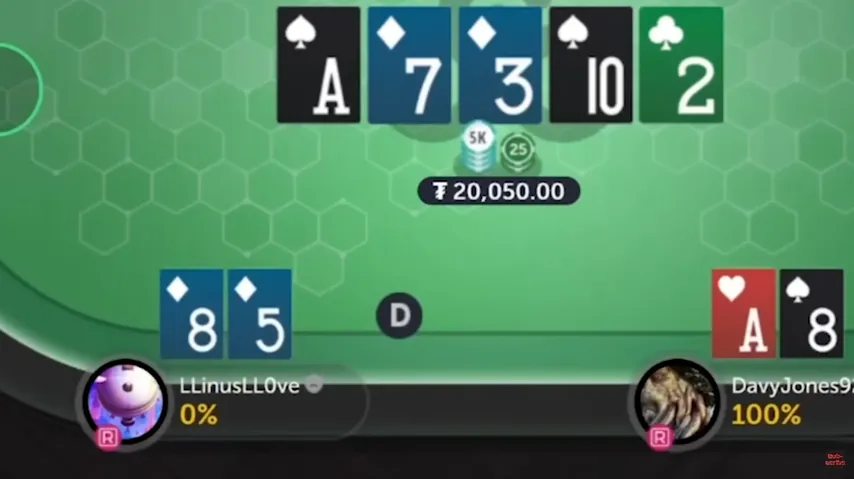
I guess he was right.
So, if you know your opponent is aggressive and unlikely to give up enough bluffs, then you can stop folding and start calling more often. Identify spots where players can easily have a lot of air in their range, like in this spot, where sticky players can float a lot of overcards with backdoor flush draws. When they carry many of these air hands from the flop to the turn and also to the river, chances are they cannot resist bluffing them at some point.
You will want to make some uncomfortable hero calls. However, this only works against players that you know are aggressive. Against the average opponent, folding isn’t even an issue and is probably the best play because most players still under-bluff. So instead of fixing your over-folds, what can work much better for you in practice is to exploit population’s over-folds.
Be more aggressive in general and make use of the fact that you have more fold equity than you should.
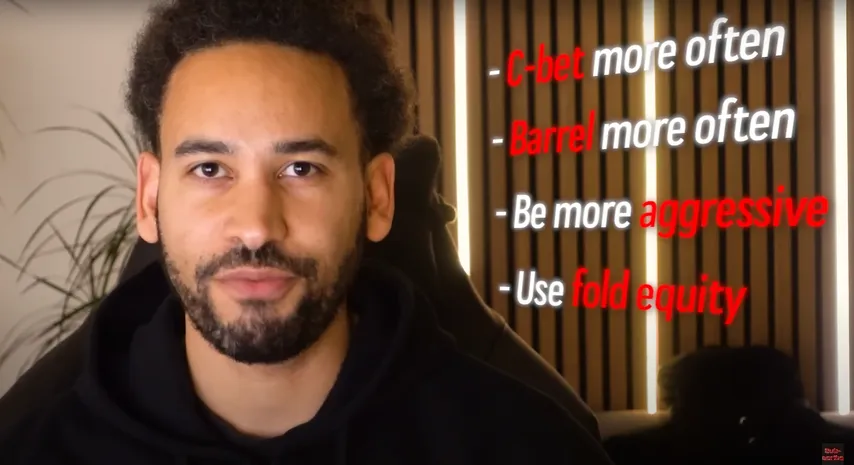
Just watch out that you don’t do it against someone like DavyJones.
